
 |
|
|
#91 |
|
Arms Historian
Join Date: Dec 2004
Location: Route 66
Posts: 10,610
|
Looking further into the choice of the word 'spadroon' and perhaps my query on it should have been directed more toward its semantics than etymology, I found some interesting notes in Egerton Castle's book "Schools and Masters of Fence" (p.207). These would seem to somewhat support my thoughts toward the term being more of a pretentious application used with reference to gentlemans fencing weapons and techniques of the times. Coupled with neoclassic allusion and the cultured elegance obsessions of the gentry, the term seems to have been more of a colloquial term in the sense of a fad of this period referring to cut and thrust.
Castle notes on p.207, "...the Italians and Germans had, it is true, a cutting play of thier own, and from them we took our so-called 'spadroon' or cut and thrust play, but it was practiced with weapons extremely light in comparison with our English backsword". On p.243, Castle notes further, "...a cutting sword of still narrower dimensions, and with a much simpler guard approximating that of the smallsword was called 'spadroon' in England; it was in fact similar to the German cut and thrust rapier of the 18th century, which has been called spadone or spadrone since the disuse of the regular two handed swords, in the same way as the claymore retained the old name of a very different weapon". * the reference to claymore of course meaning basket hilt, while the actual claymore was the Scottish two hand great sword. "...the German spadroon was a regular double edged sword, but any light back or shearing sword was so called in English. Best regards, Jim |
|
|

|
|
|
#92 |
|
Member
Join Date: Jul 2009
Location: Nipmuc USA
Posts: 530
|
Bingo

|
|
|

|
|
|
#93 |
|
Member
Join Date: Jul 2009
Location: Nipmuc USA
Posts: 530
|
Well duh. I do live under a rock in looking at the past. Some quite interesting beading from the past.
http://www.myarmoury.com/talk/viewtopic.php?t=13784 Cheers Hotspur; I wonder if the Switzzlers and Germane-ish types were masonic sarcasm, please excuse a senile old man |
|
|

|
|
|
#94 | |
|
Arms Historian
Join Date: Dec 2004
Location: Route 66
Posts: 10,610
|
Quote:
Aw Glen, ya rascal!!!  Very good observation, and you're right, they're beads of sorts  Great to see Eljays work, he's always been brilliant at working on swords, from when we collected British patterns in California together about thirty some years ago. I truly learned a lot from him and his knowledge of European swords, which gives his work the elegance that is well known. Nice one Glen....and uh, senile is not you... you're too sharp !(sword pun)  All the best, Jim |
|
|
|

|
|
|
#95 | |
|
Member
Join Date: Jul 2009
Posts: 607
|
Quote:
Thanks! |
|
|
|

|
|
|
#96 | |
|
Member
Join Date: Dec 2004
Location: B.C. Canada
Posts: 473
|
Quote:
It simply states that this is the "seahorse version of the naval officers sword". I will include a scan of the caption (sorry about the poor quality). All the best Jeff |
|
|
|

|
|
|
#97 | |
|
Member
Join Date: Jul 2009
Posts: 607
|
Quote:
|
|
|
|

|
|
|
#98 | |
|
Member
Join Date: Dec 2004
Location: B.C. Canada
Posts: 473
|
Quote:
Jeff |
|
|
|

|
|
|
#99 |
|
Member
Join Date: Dec 2004
Location: NC, U.S.A.
Posts: 2,198
|
Yes,green with envy,Dmitry!! Very nice sword...
Jeff, you show a naval reference. It wouldn't happen to be 'LeSabre D' abortage' by M Petard, would it? I was wondering if anyone can recommend this book? If it's not Petard's, could you name this reference? Thanks! Mark Last edited by M ELEY; 5th September 2010 at 04:39 AM. |
|
|

|
|
|
#100 | |
|
Member
Join Date: Dec 2004
Location: B.C. Canada
Posts: 473
|
Quote:
Hi Mark, I think I listed it on the original scan which Dmitry was inquiring about. It is Michel Petard's Des Sabres et Des Epees Tome I . All the Best Jeff |
|
|
|

|
|
|
#101 |
|
Member
Join Date: Dec 2004
Location: NC, U.S.A.
Posts: 2,198
|
Thank you, Jeff. Sorry I missed the original reference. I'll have to keep an eye out for a copy of Petard's volume.
|
|
|

|
|
|
#102 |
|
Member
Join Date: Jul 2009
Location: Nipmuc USA
Posts: 530
|
I know that sword Dmitry
 Another possible small naval from Shiloh came my way this spring and I had adopted it. This one is really quite an oddball and maybe harder to place in time than the hippocampus counterguard. I had seen another twin to that one somewhere and I am forgetting where. Another possible small naval from Shiloh came my way this spring and I had adopted it. This one is really quite an oddball and maybe harder to place in time than the hippocampus counterguard. I had seen another twin to that one somewhere and I am forgetting where.Cheers GC |
|
|

|
|
|
#103 |
|
Member
Join Date: Dec 2005
Posts: 164
|
Hi Jim,,
The sword that you used in the your first post is still hanging in my collection. I have another spadroon that I am thinking about buying yet I am having a bit of trouble identifying the model,,I have determined it to be made by Wooley,,due to a vague mark near the ricasso I will attach some very poor pics of the hilt and perhaps one of you guys will recognize it. One of the photos in the post above mine has a very similuar hilt yet has a large curved blade. Mine has a straight sharp blade like the 5 ball hilt in the picture you used in the original post. I apologize for the quality of the photos,I had to take with a cell phone and will post better ones if I decide to make the purchase. Thanks for any input 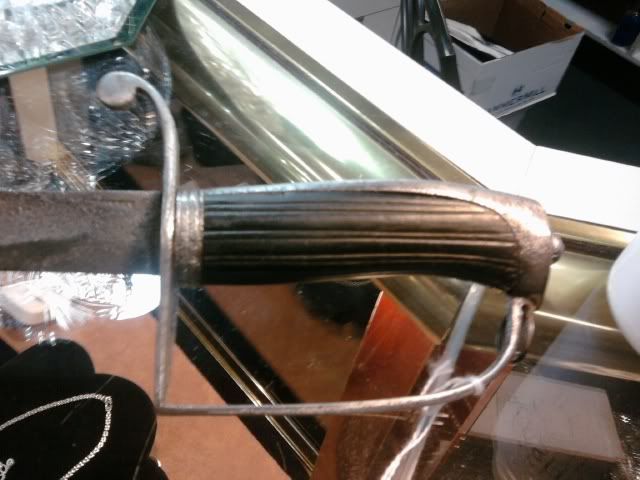 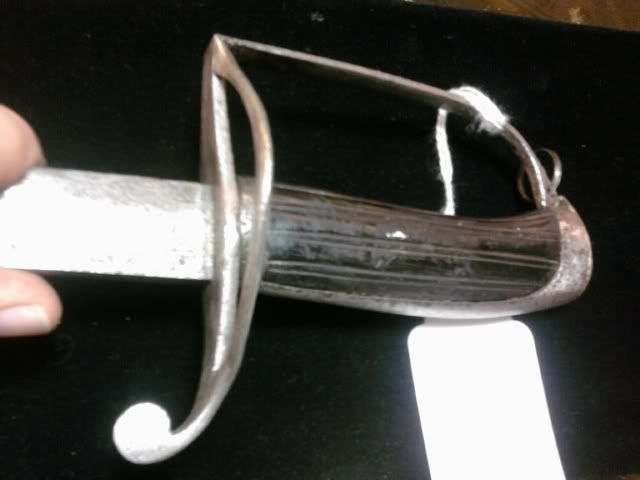 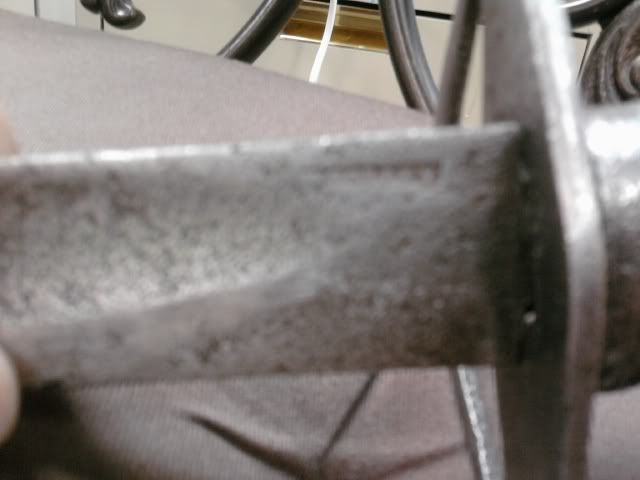 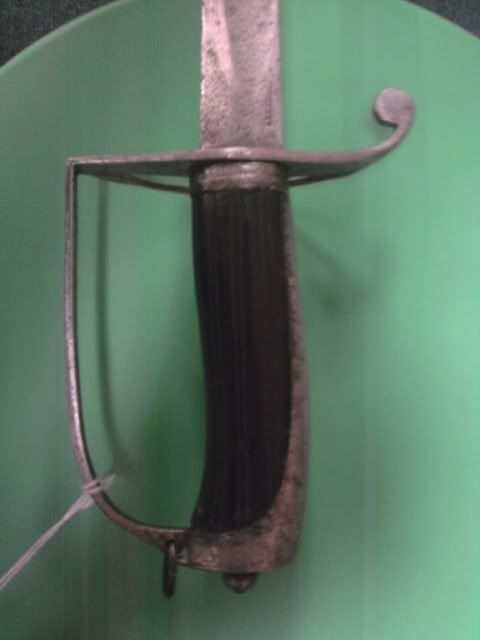 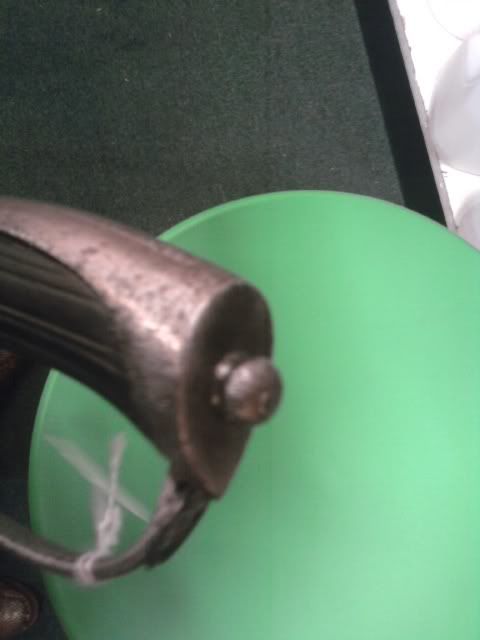
|
|
|

|
|
|
#104 | |
|
Member
Join Date: Jul 2009
Posts: 607
|
Quote:
This is a nice sword in French style. It's not naval, but an army officer's, perhaps etat-major. |
|
|
|

|
|
|
#105 |
|
Member
Join Date: Dec 2004
Location: NC, U.S.A.
Posts: 2,198
|
Beautiful sword, Glen! As Dmitry pointed out, it's probably French and with no absolute naval provenance, there's no way of proof. However, In Annis book on sea swords, he does say that hangers (which were very popular with naval personnel) that had nautical motiffs might very well have seen service at sea. Things such as shell guards, sea horses, anchors, Poseidon, ocean waves, etc, that wouldn't normally appeal to a hunter (who would prefer a more decorated piece with wild boar, splay of weapons, hunting dogs, powderhorn decoration, etc, etc. In 'Swords for Sea Sercive', May says that some of these might have also appealed to Marine officers, if not naval personnel. Of course, your sword isn't a hanger, but one never knows where it might have served.
|
|
|

|
|
|
#106 |
|
Member
Join Date: Jul 2009
Location: Nipmuc USA
Posts: 530
|
Thanks Dmitry,
This one was in really rough condition, with the blade covered with a deep layer of crusty rust. The wear side ha been ground down as if mounted on a display and still retains some of the screws in the hilt. This had been priced accordingly for my budget and was of interest for exactly threads such as this one. Cheers GC |
|
|

|
|
|
#107 | |
|
Arms Historian
Join Date: Dec 2004
Location: Route 66
Posts: 10,610
|
Quote:
Hi Alan, That sword is indeed a beauty!!! and this one is nice also, especially marked to Wooley. This is an infantry officers spadroon in my opinion, and Wooley seems to have greatly favored French fashion c.1790s and early 19th century. The fluted ebony grip is similar to grips I have seen on his sabres with brass stirrup hilts, one marked Wooley & Deakin (1801-1803). The hilt style on this corresponds to those of c.1780s and I have seen these in silver with the raised perpandicular crossguard design, it seems 1790s to about 1810. This is what I recollect offhand, but personally I think they're very attractive sabres, and in line with the five ball hilt style. All best regards, Jim |
|
|
|

|
|
|
#108 |
|
Member
Join Date: Dec 2005
Posts: 164
|
Thank you Jim,,It was the fluted ebony that made me have to have it.
Again Thank you for your knowledge Alan |
|
|

|
 |
|
|